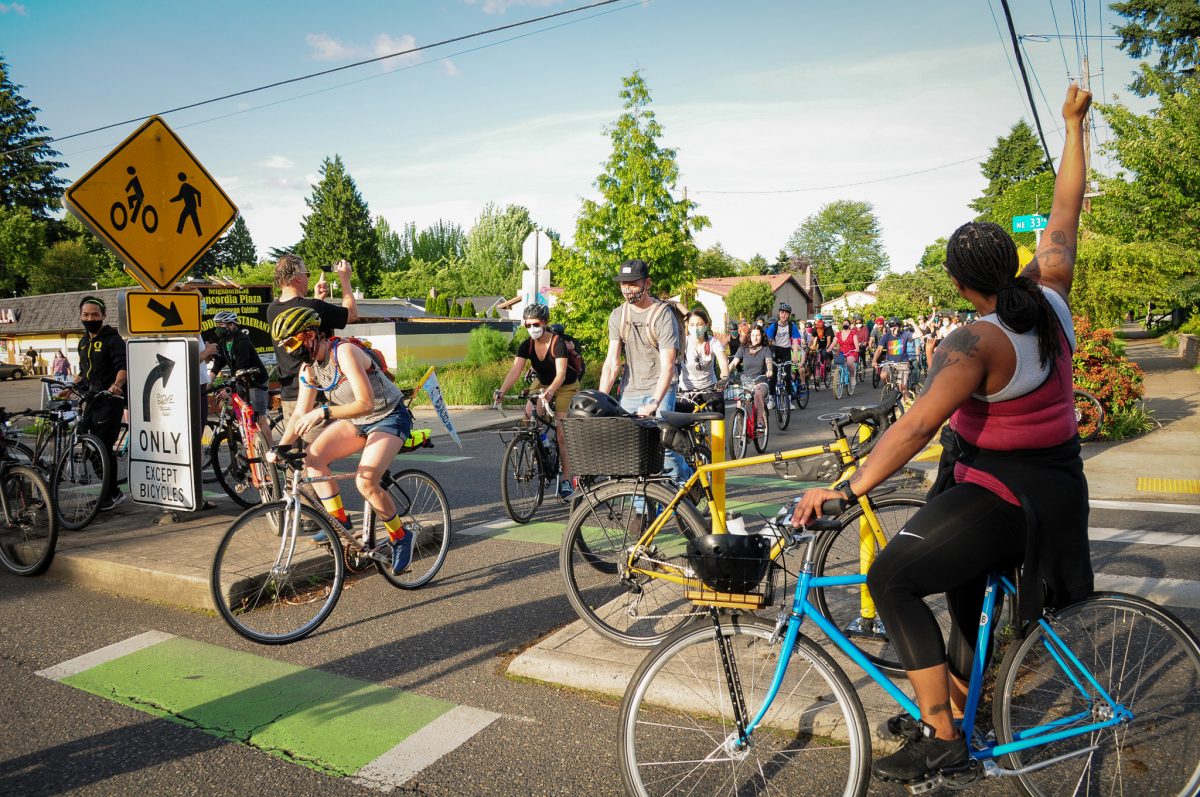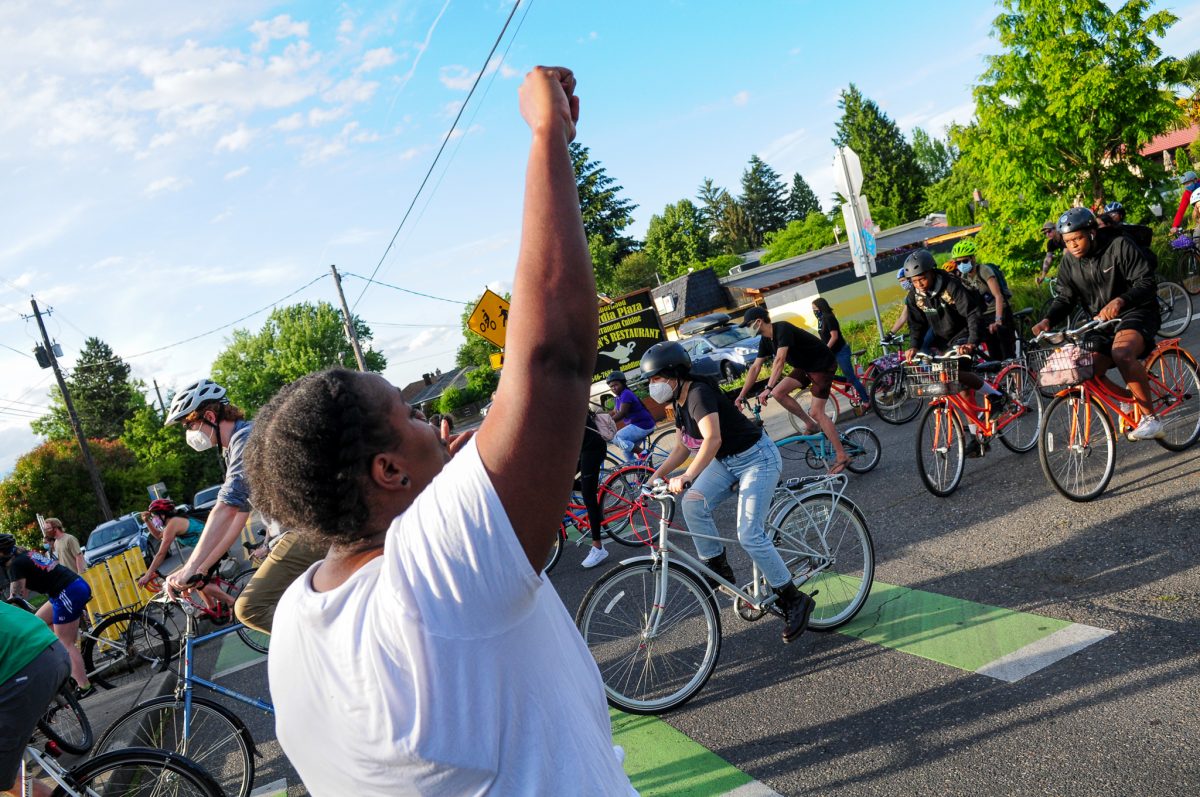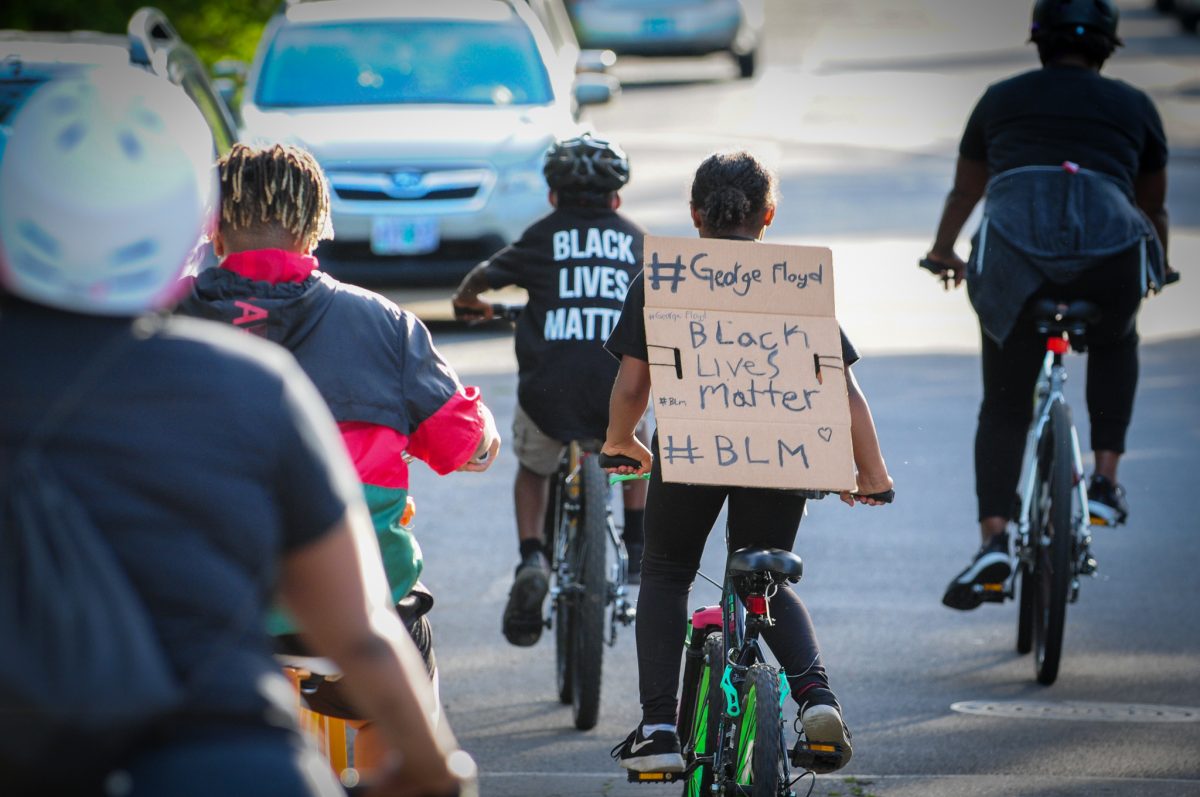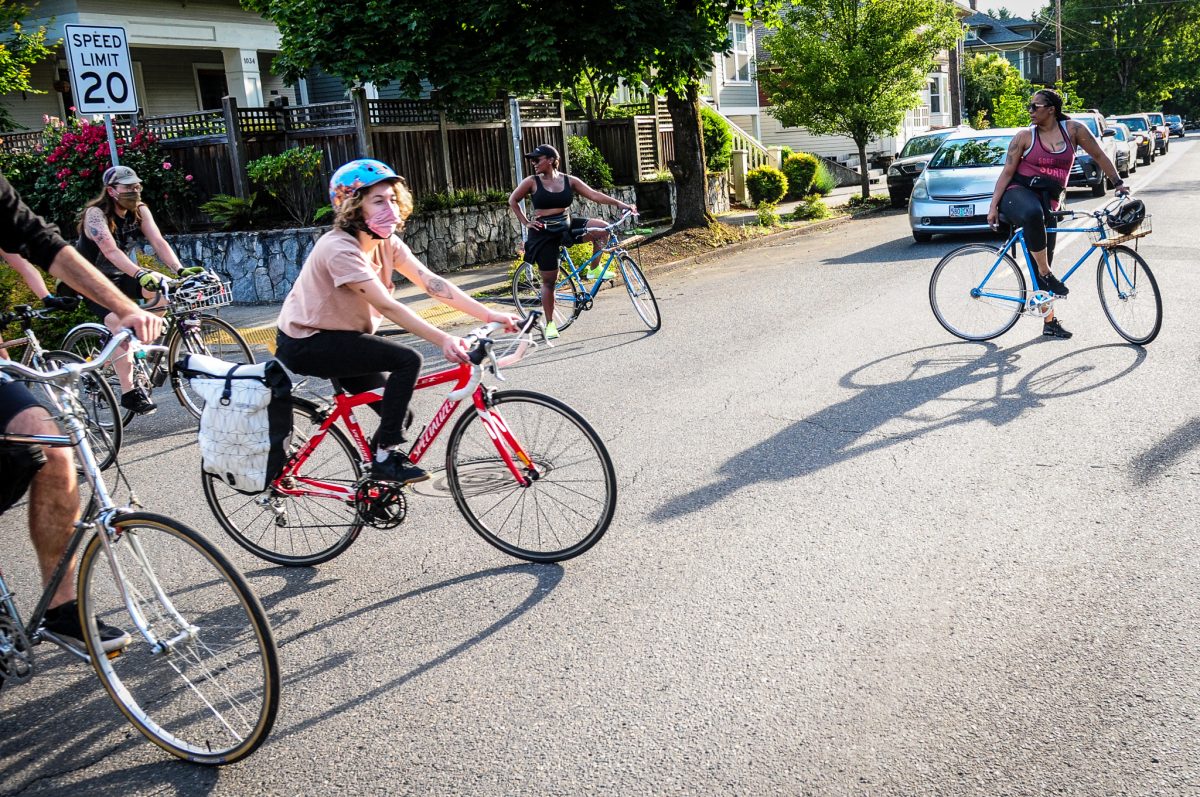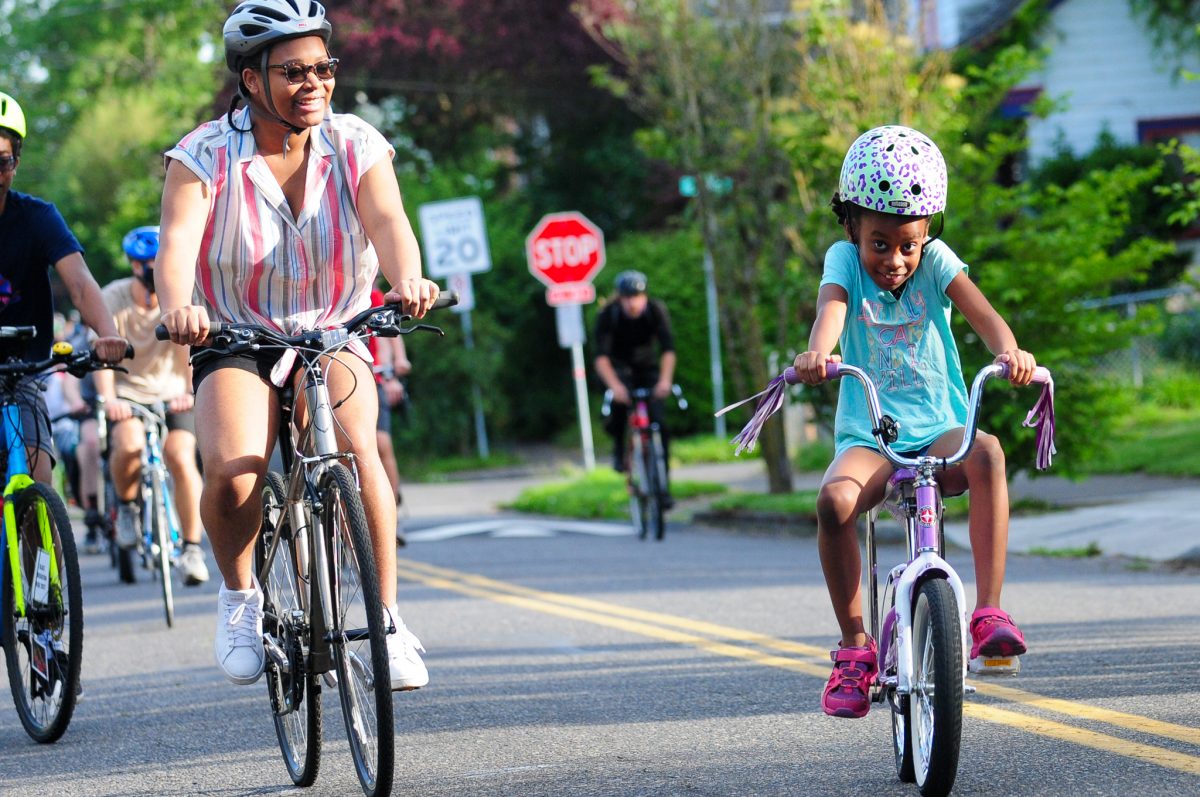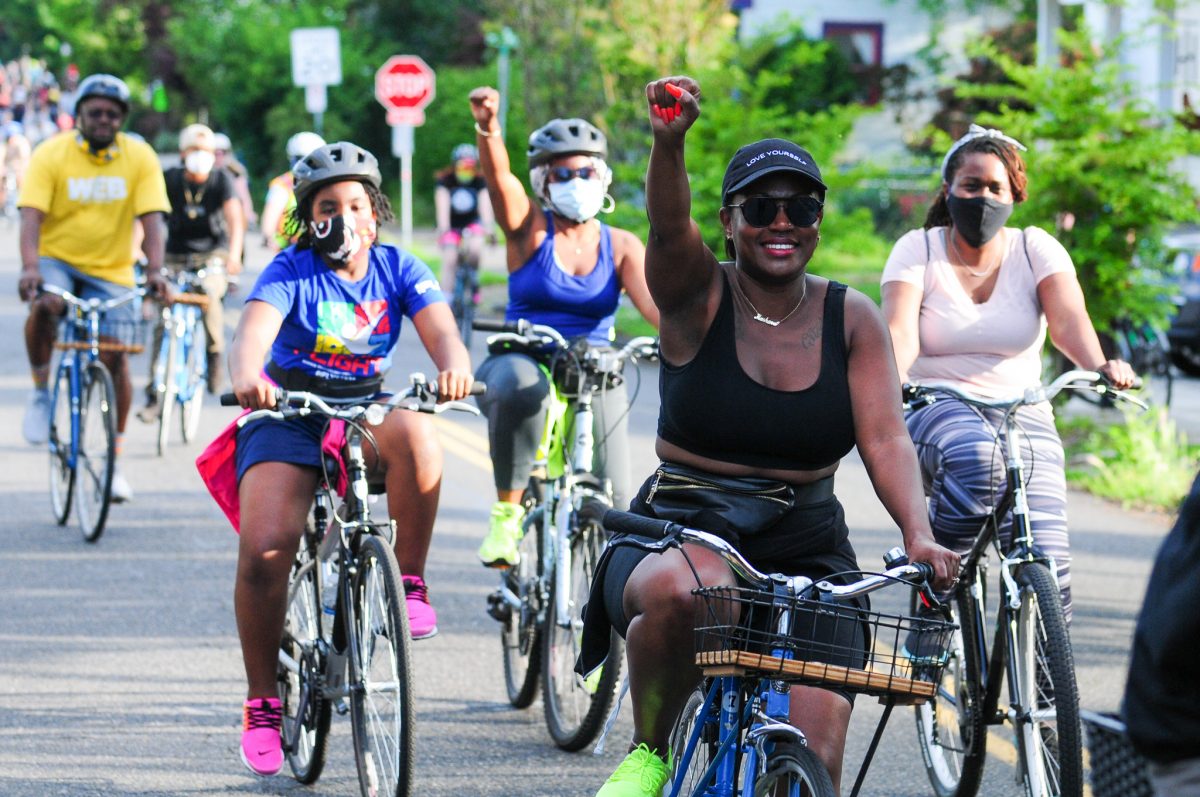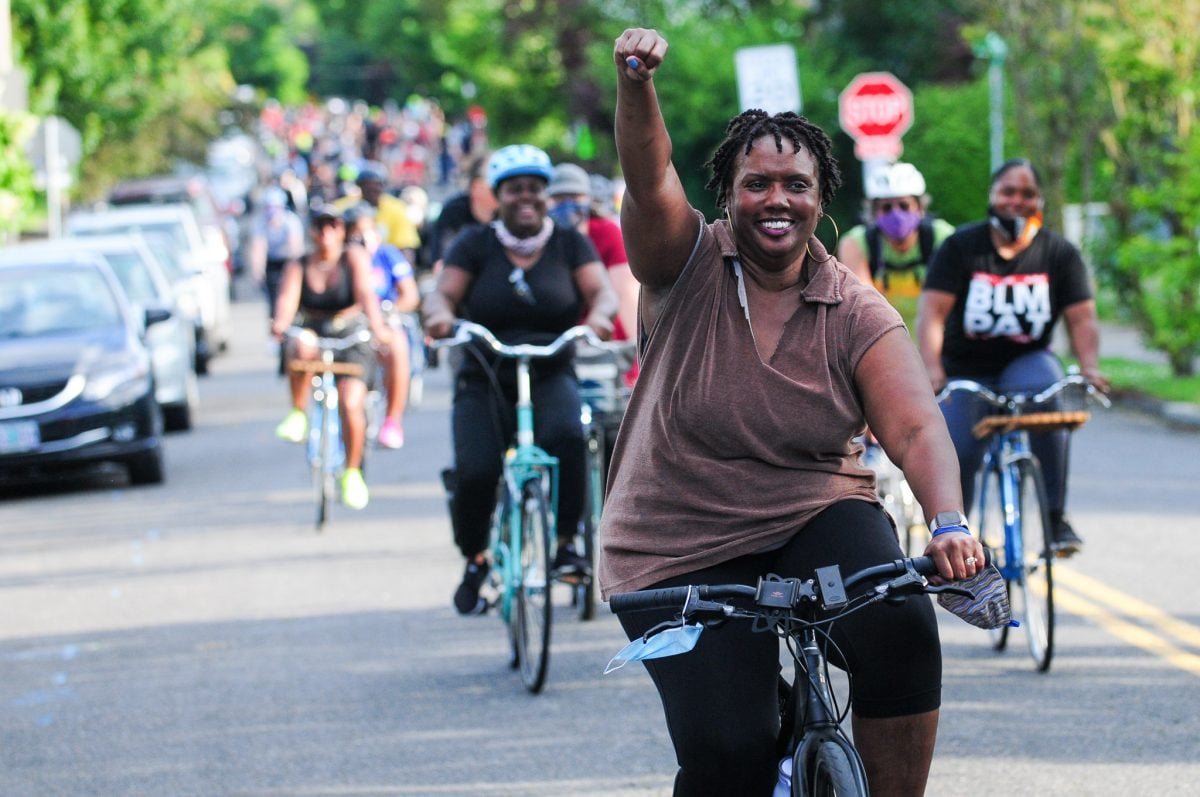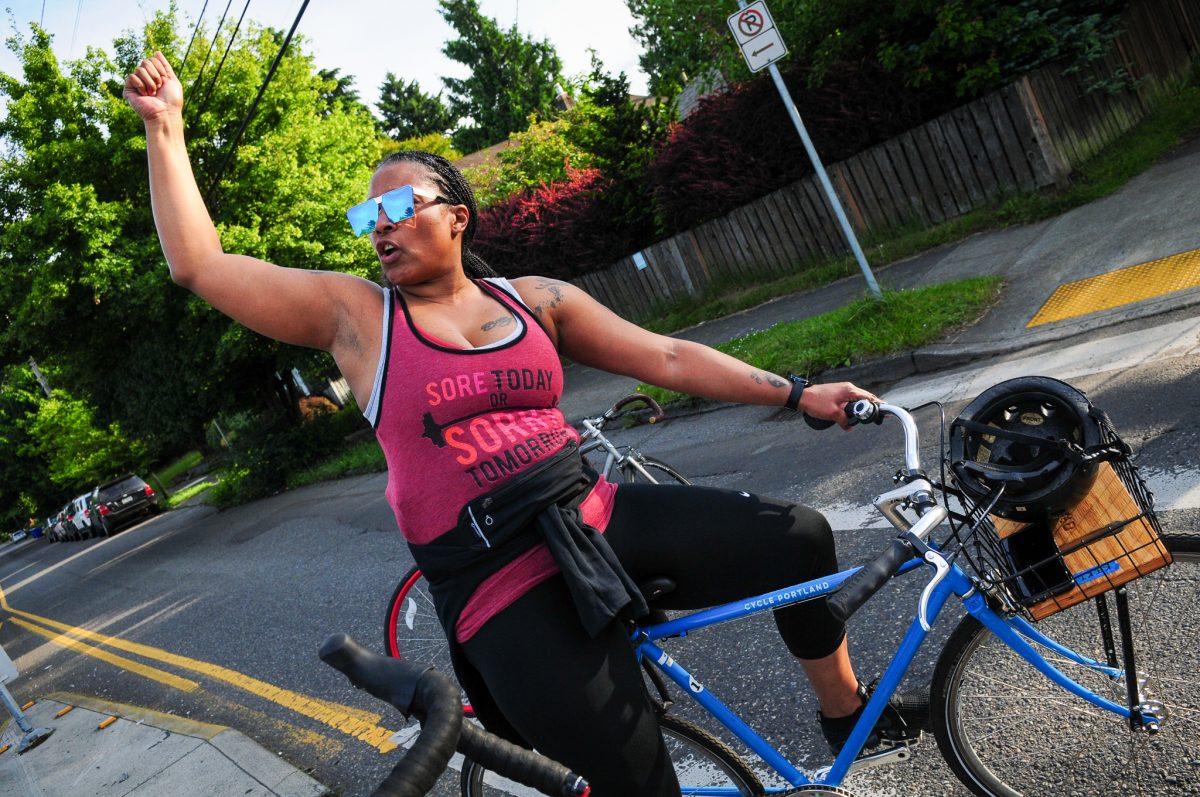
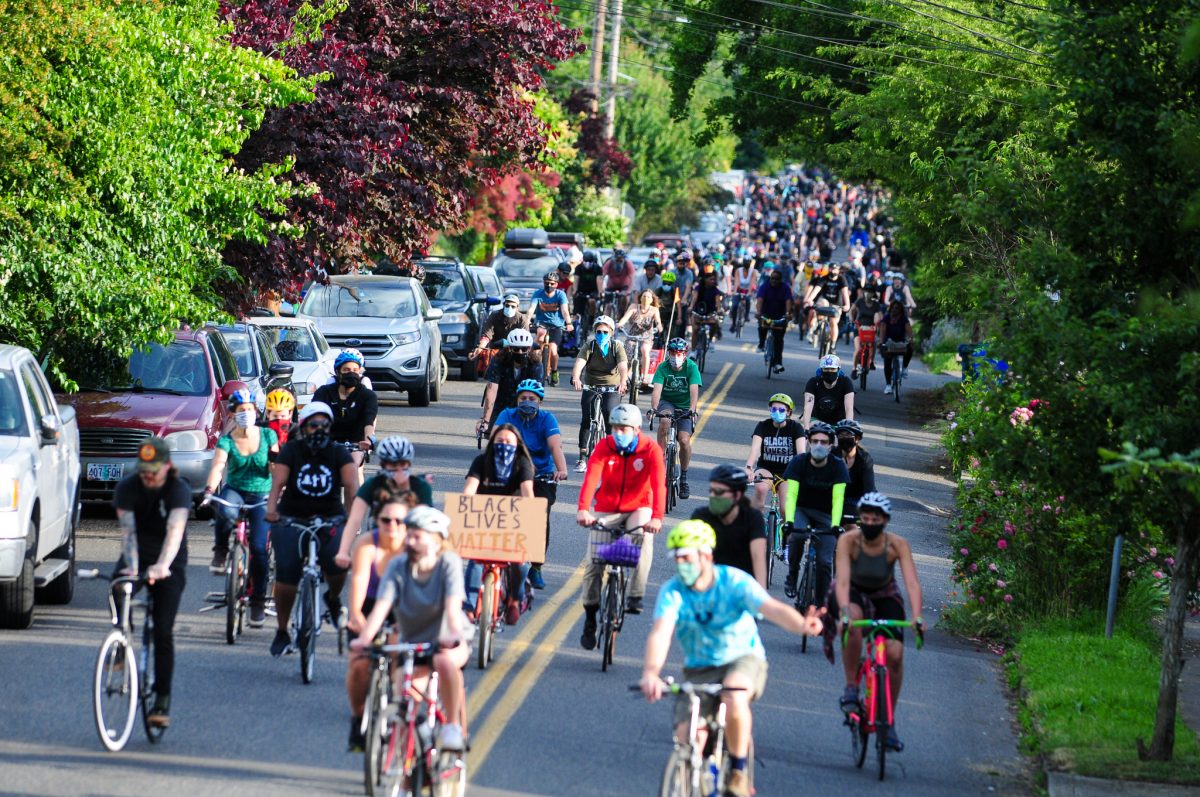
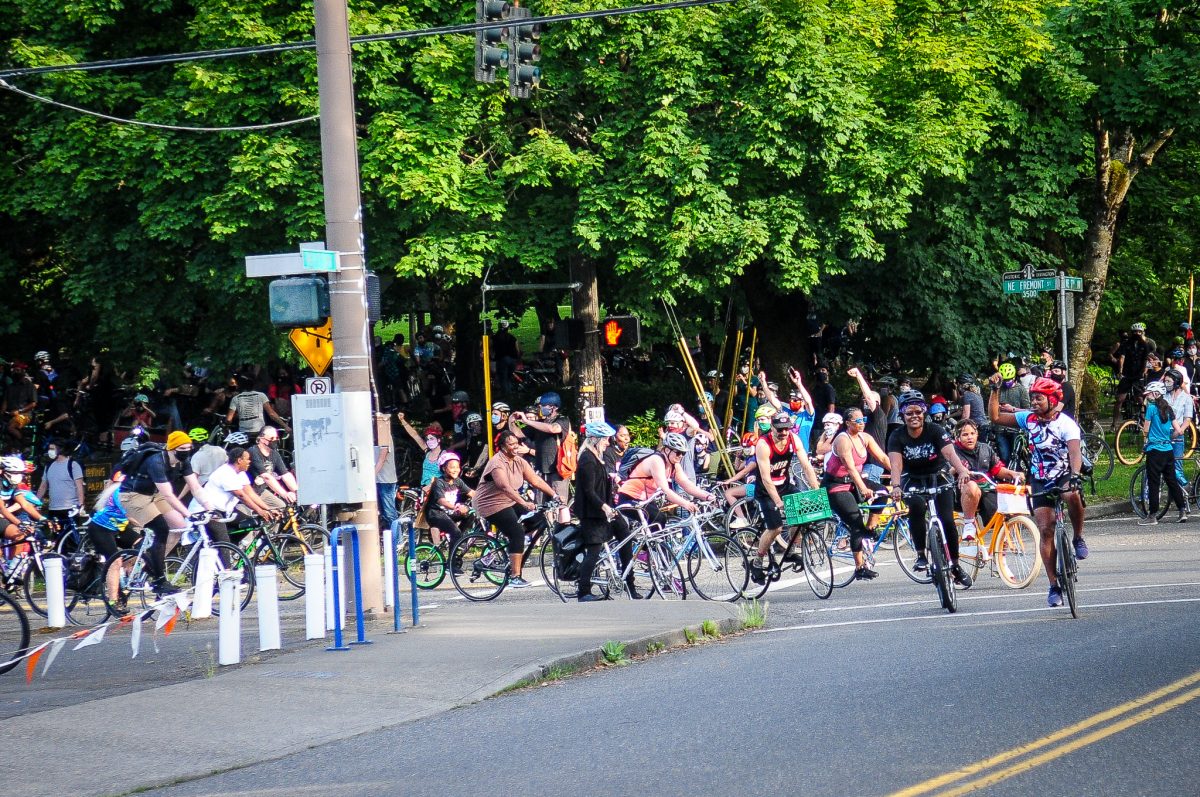

After months of quarantine and weeks of heavy-hearted news and protests, Nichole Watson and Keyonda McQuarters just wanted to let loose and go on a bike ride. So they posted it on Facebook and told their friends to join. They expected a few dozen people. What they got was closer to 2,000.
“Sometimes you need to take the lane and you need to demand that people see you and make space for you and that’s what today is about.”
— Nichole Watson
“I’m overwhelmed,” a giddy Watson shared at Irving Park before the ride started. “I just wanted to ride with my crew. Then you all showed up. Damn!”
Watson and McQuarters are leaders of Portland’s chapter of Black Girls Do Bike, a national nonprofit that builds community among women of color of who love to ride. They made last night’s ride all about having a good time (“fun is mandatory” the event flyer said) and they made sure anyone who wanted to ride would have a bike by teaming up with downtown bike shop Cycle Portland, Biketown bike share, and the Community Cycling Center for free loaners.
The crowd that showed up was the most multi-racial I’ve ever seen in this city. I’ve been on countless group bike rides in the neighborhoods around Irving Park, but the large percentage of Black residents who live on the streets are usually not among us. Until last night. We rode together, and it felt great.
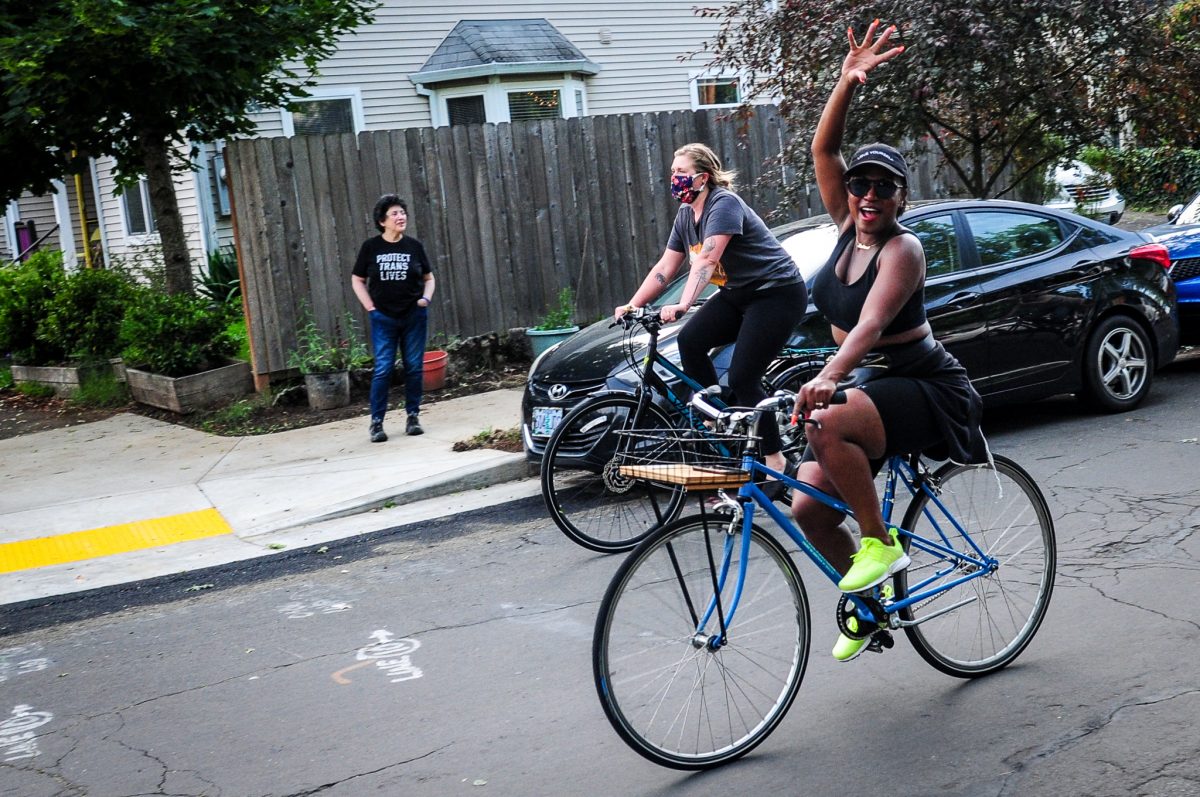
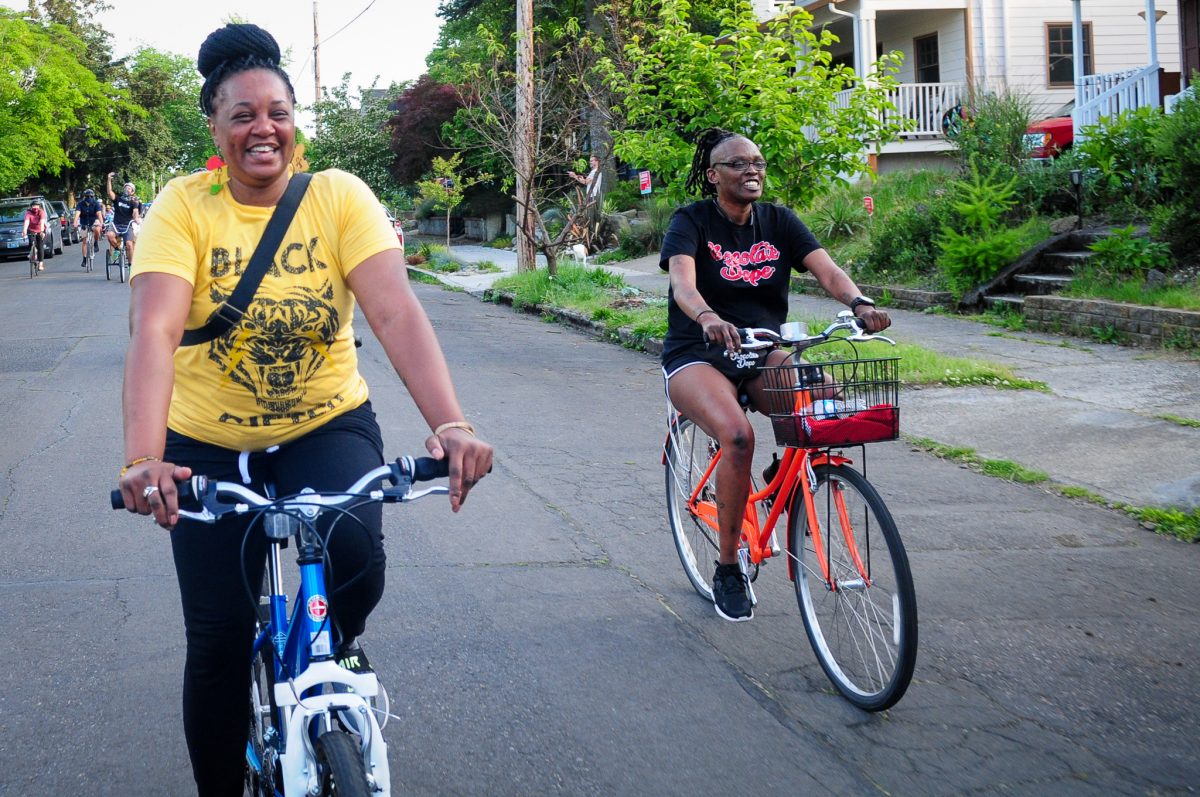
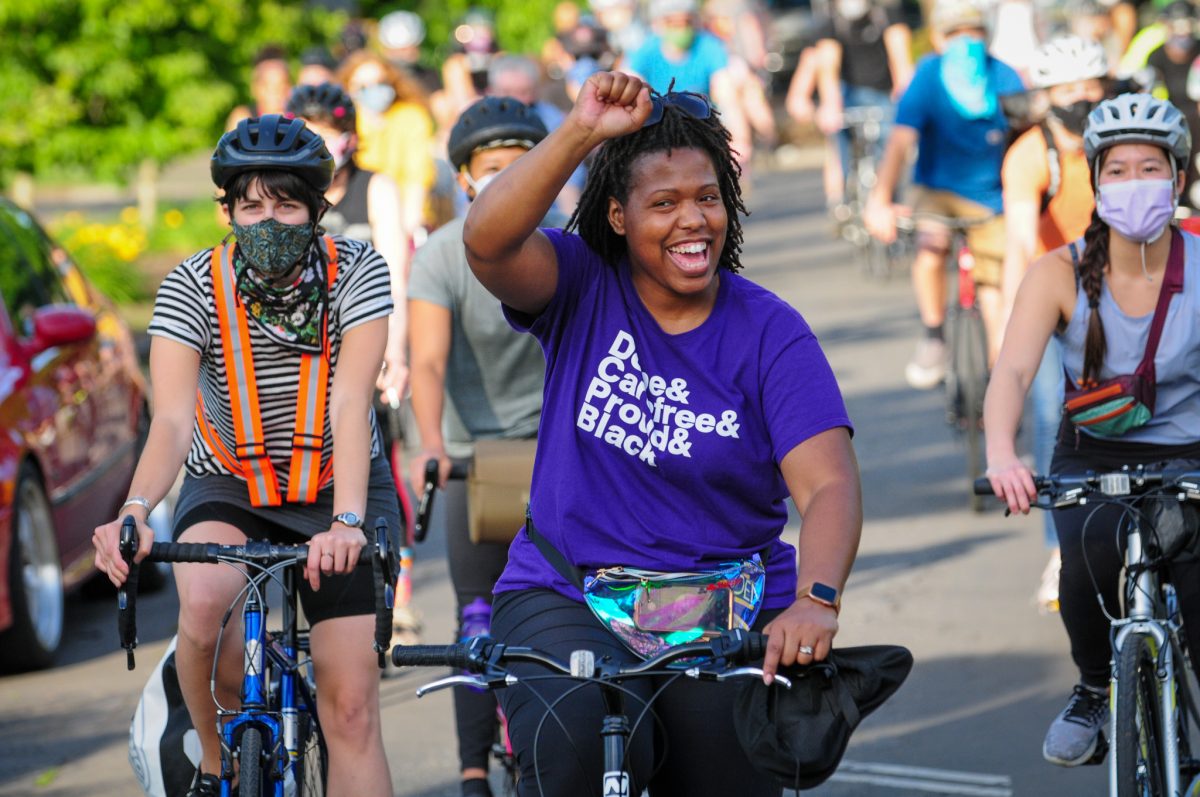
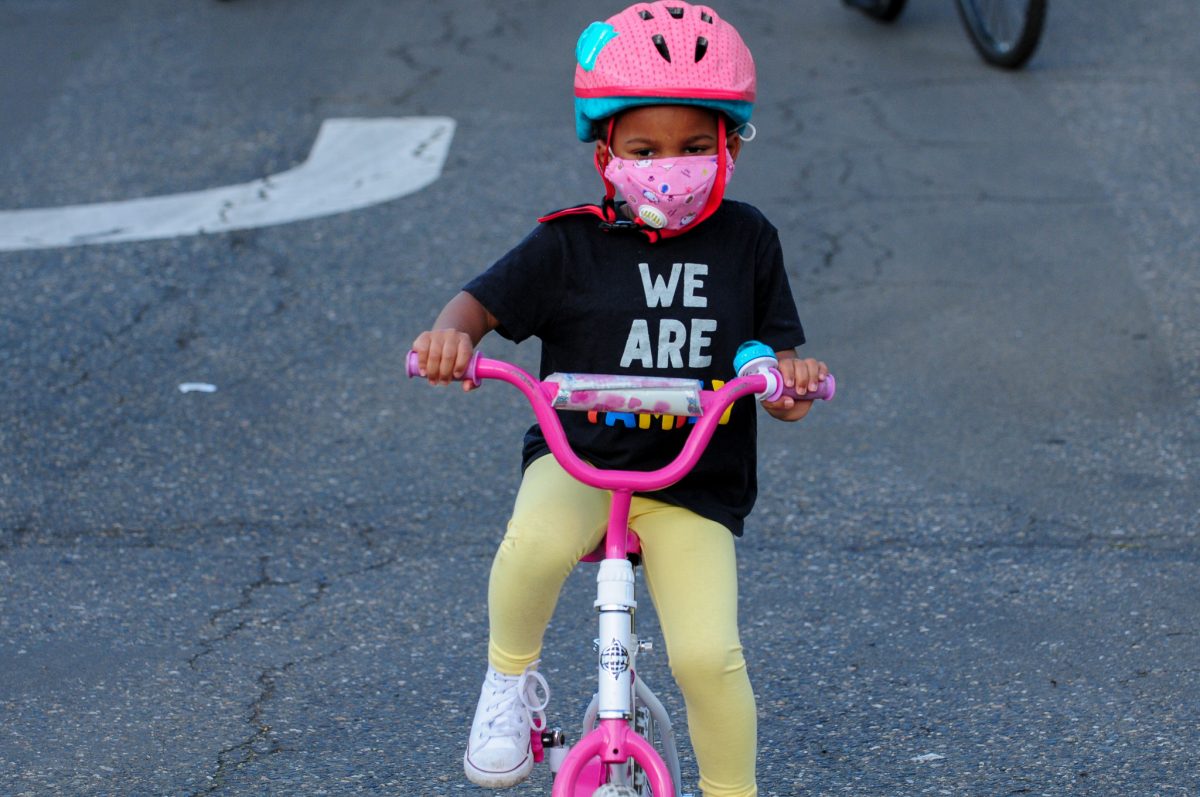

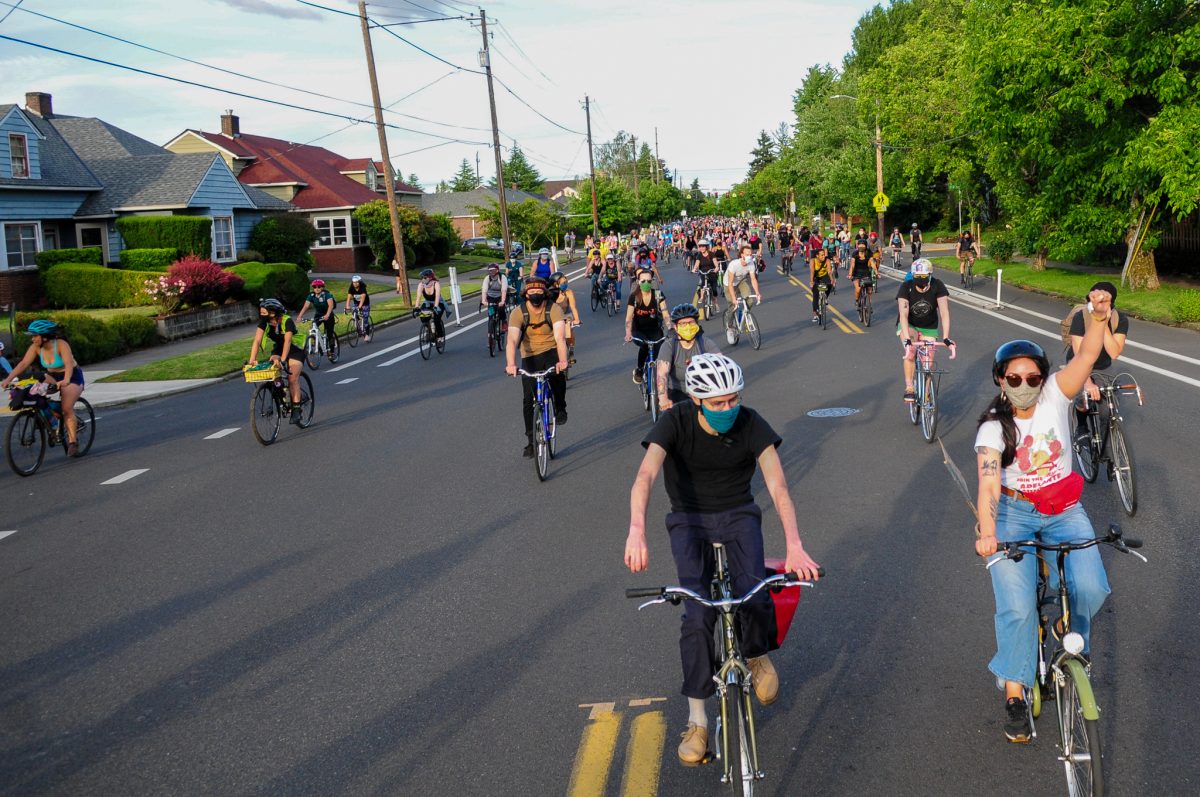
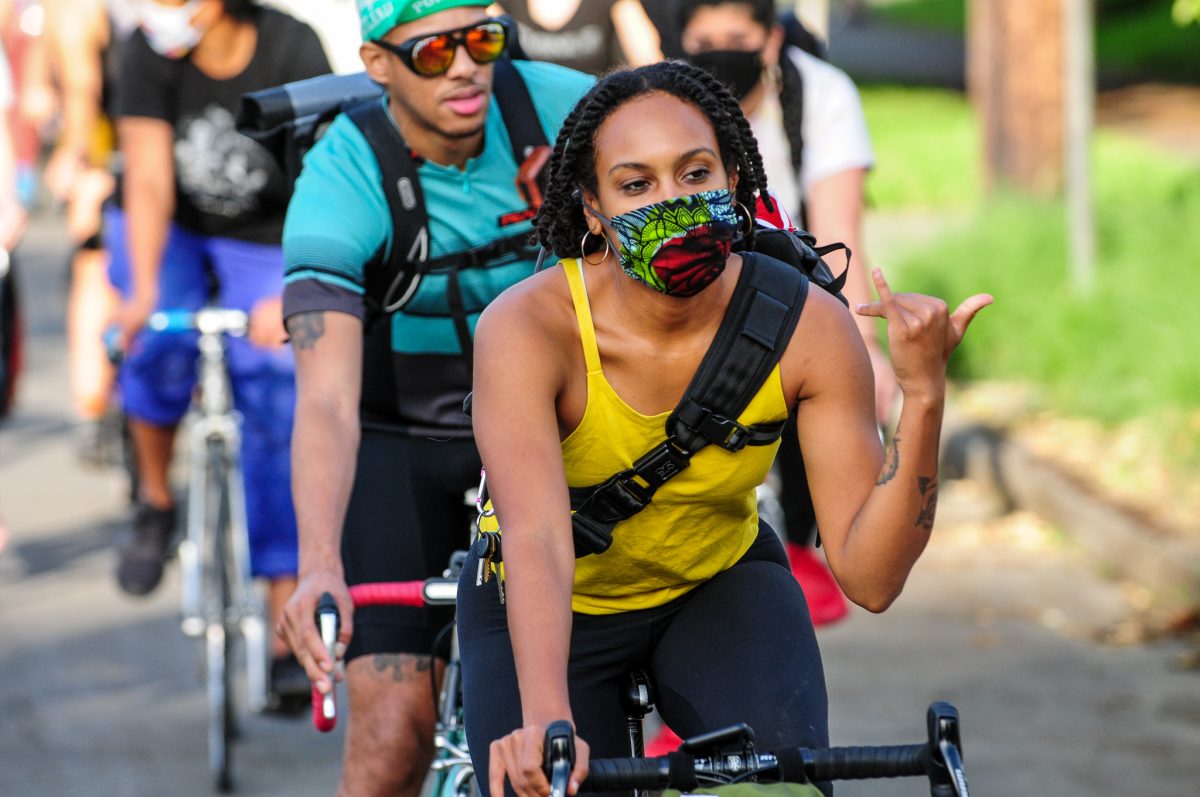
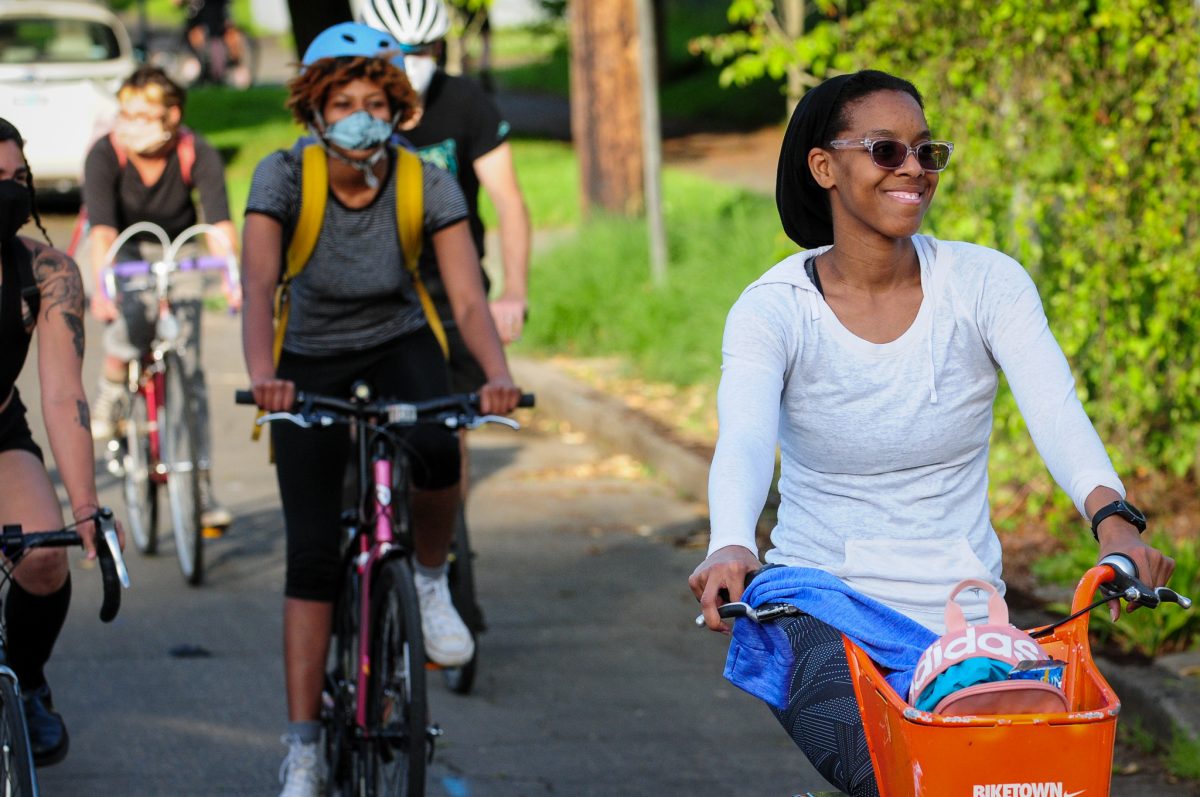
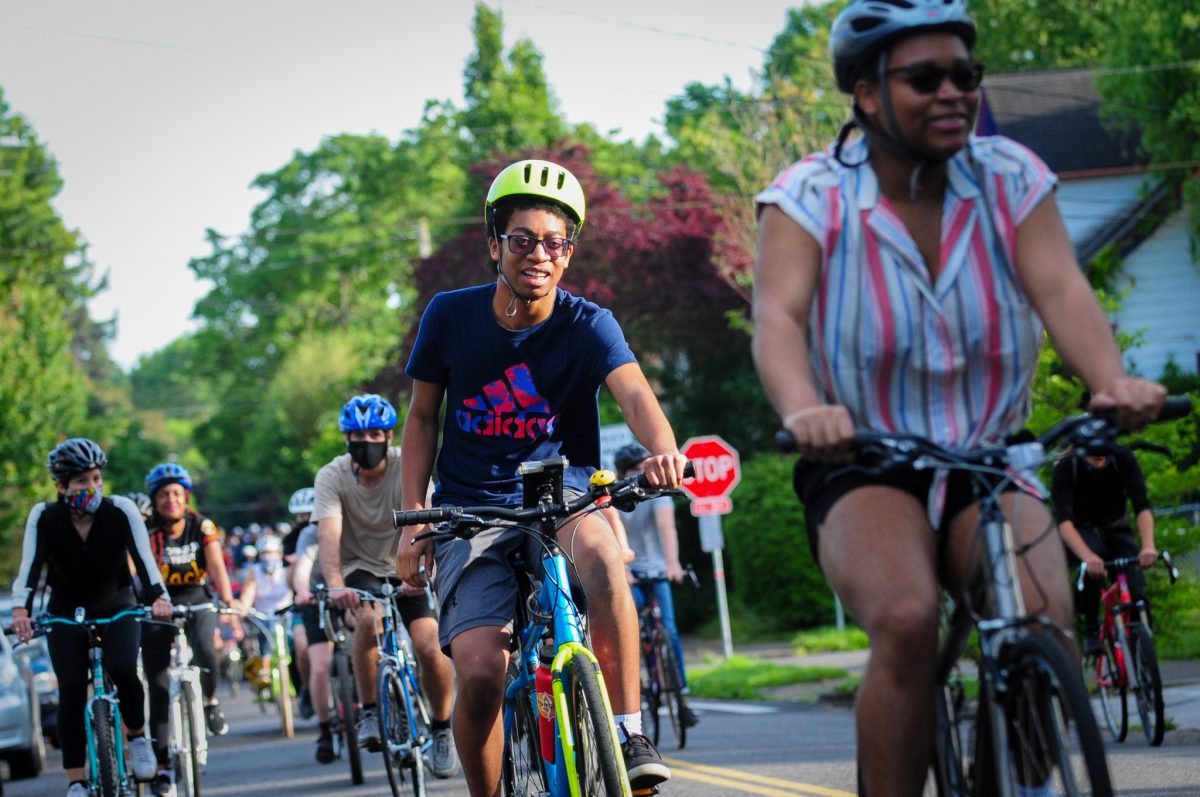
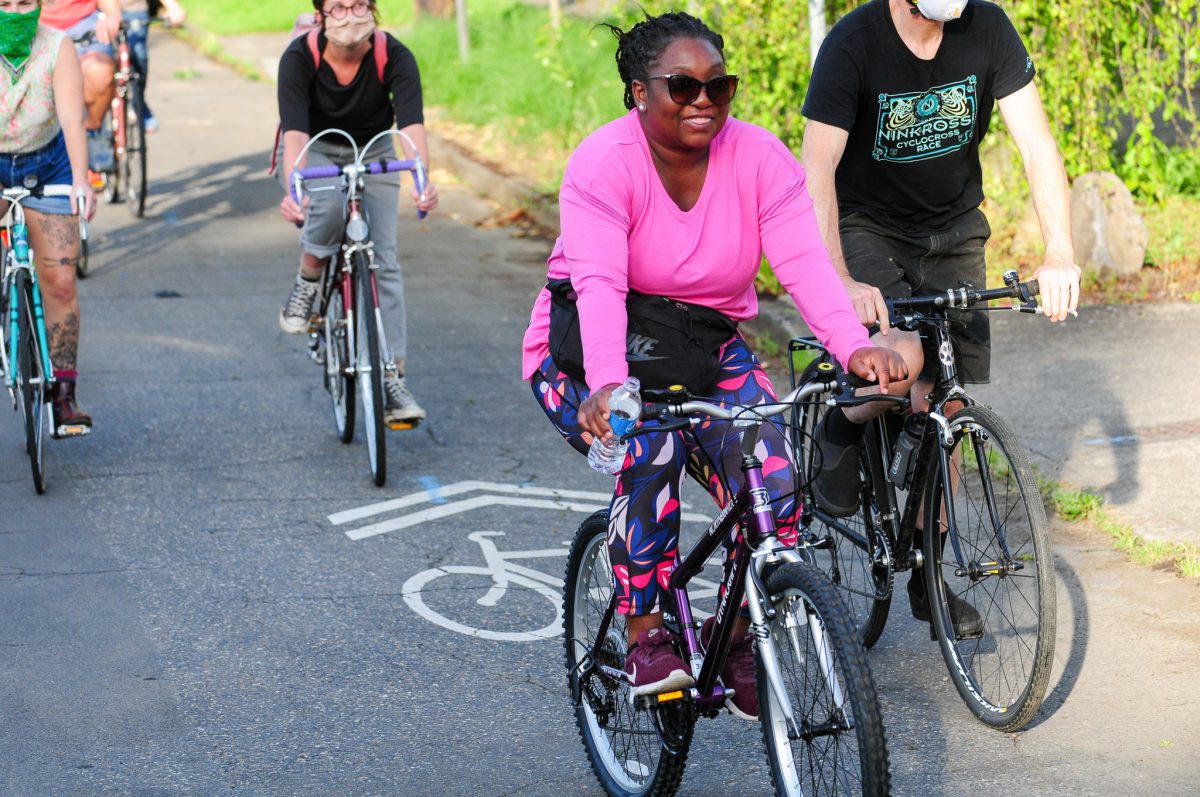
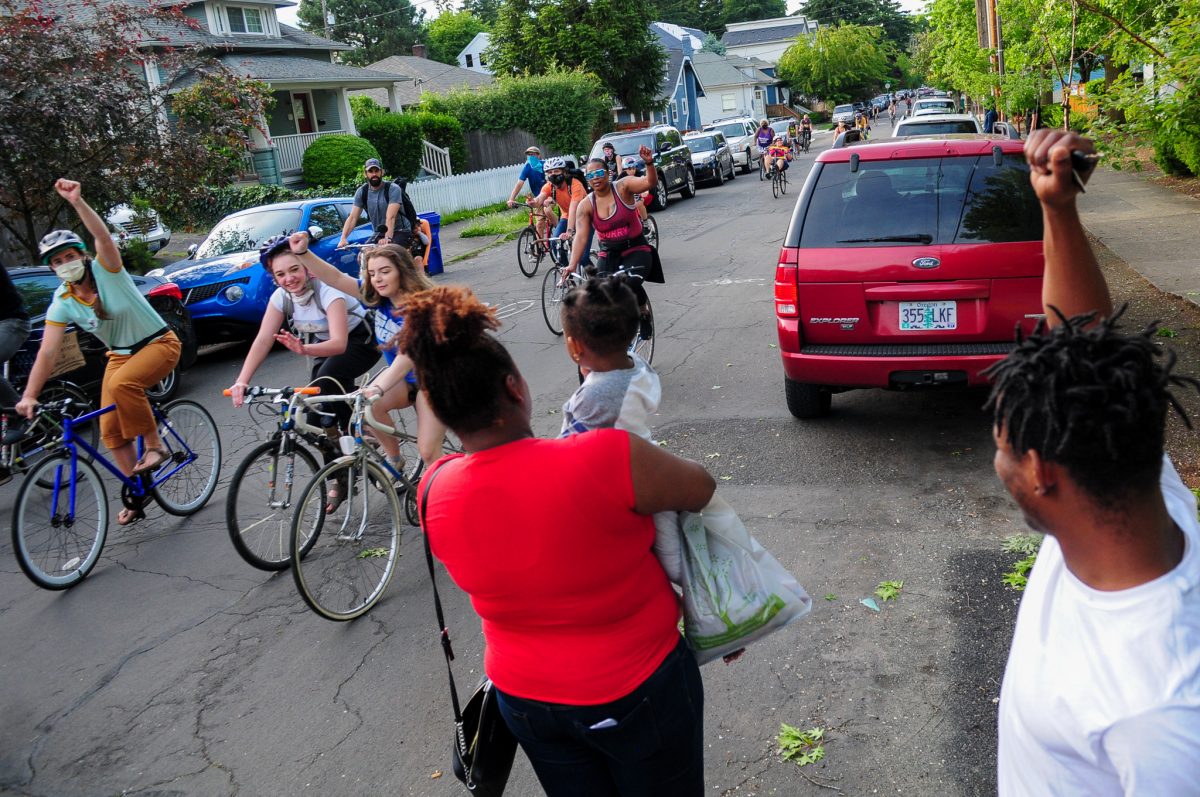
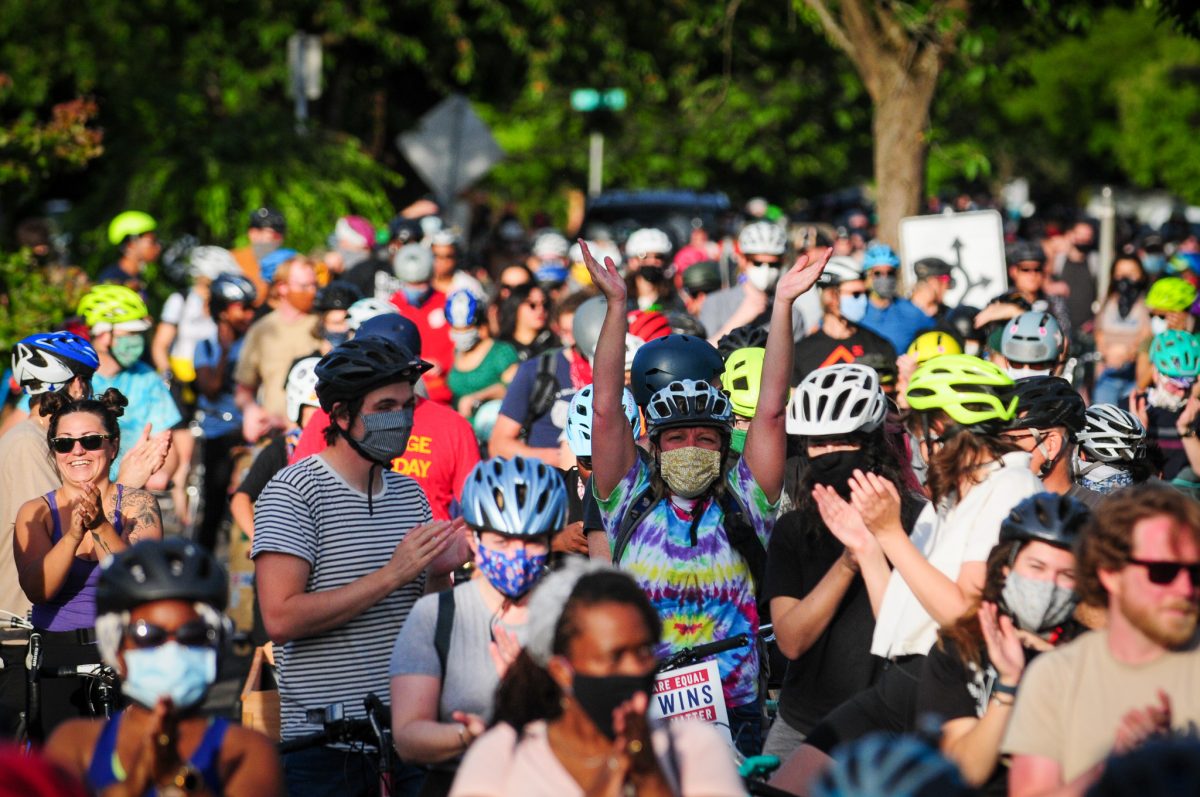
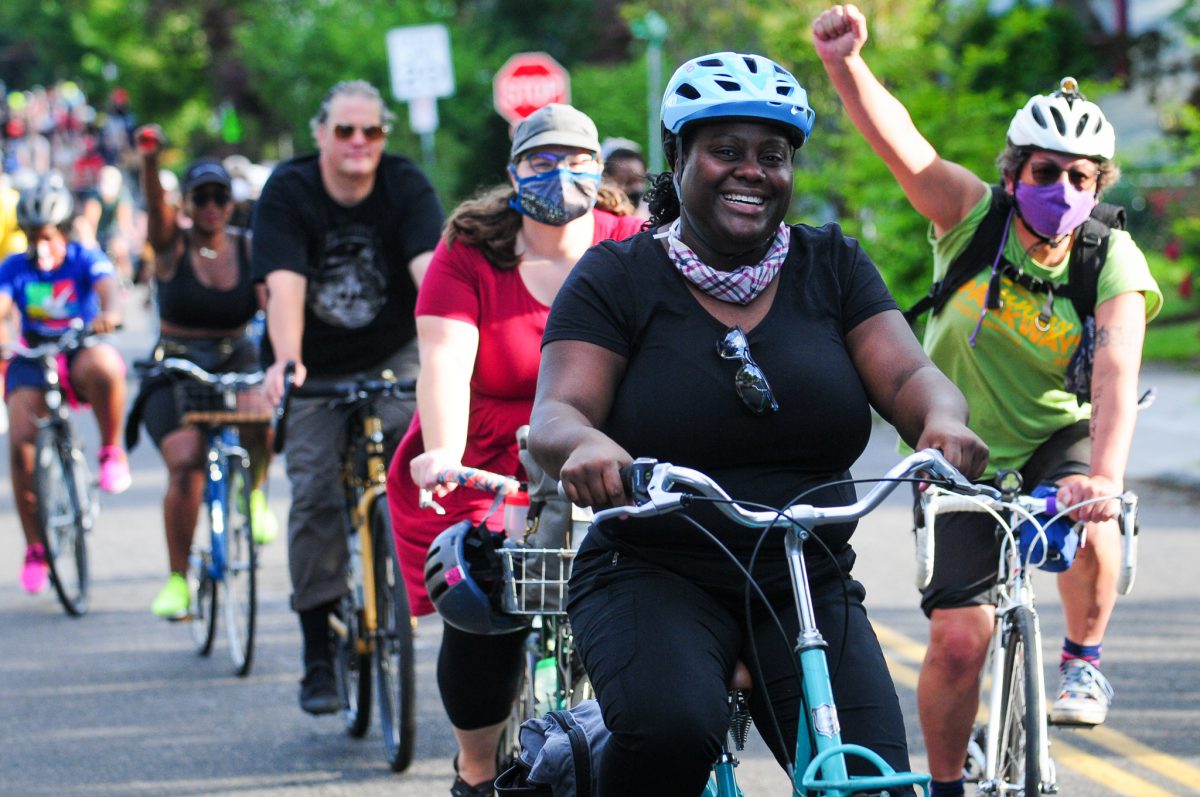
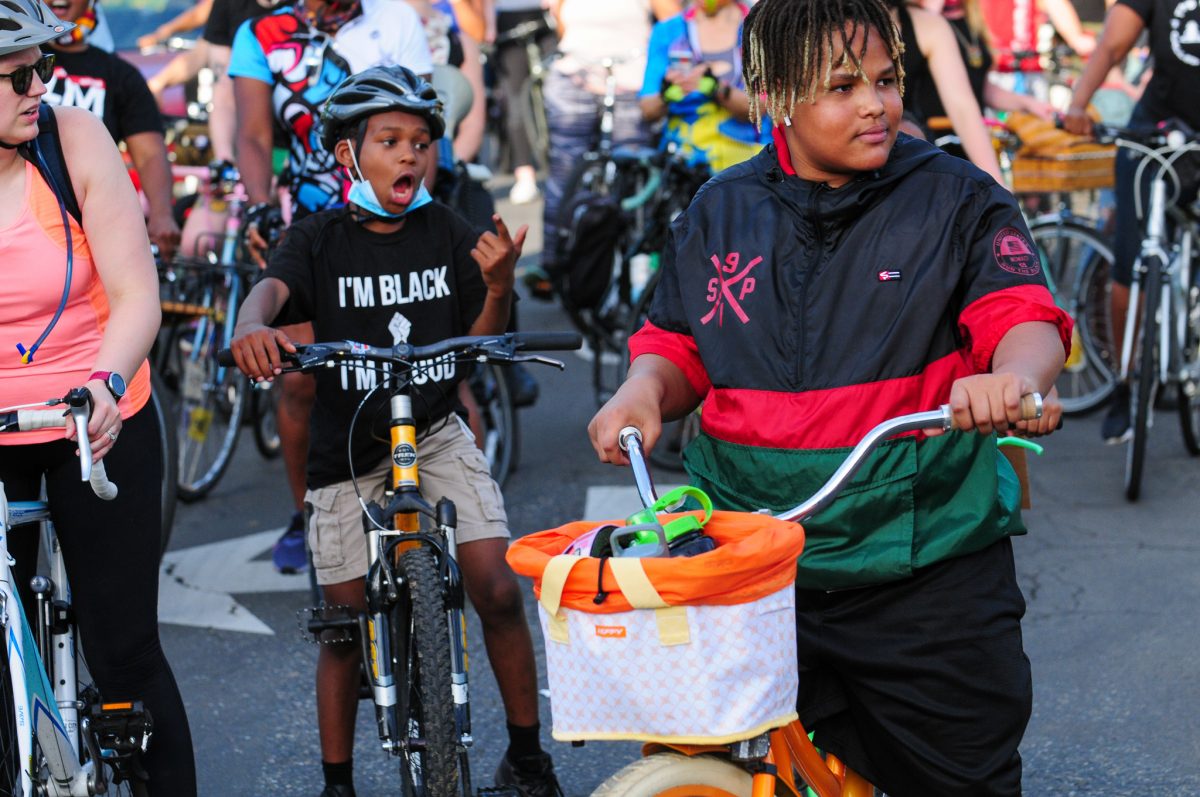

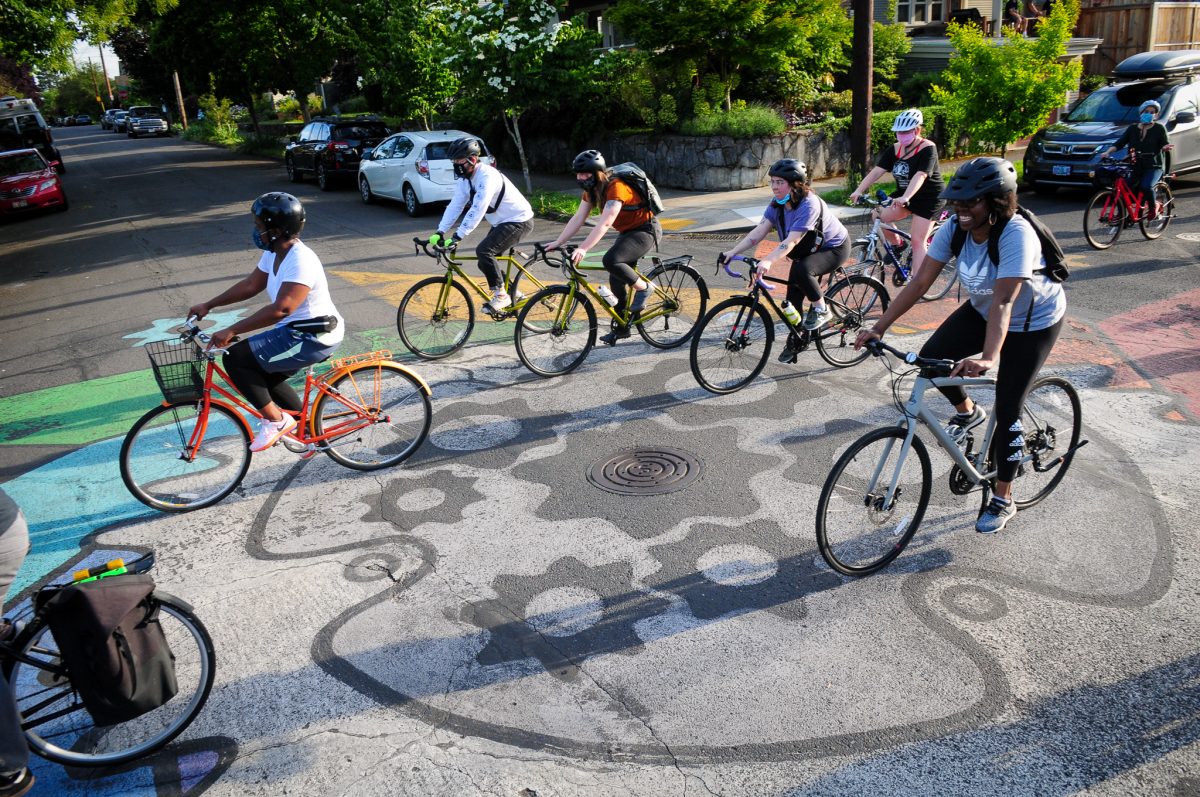
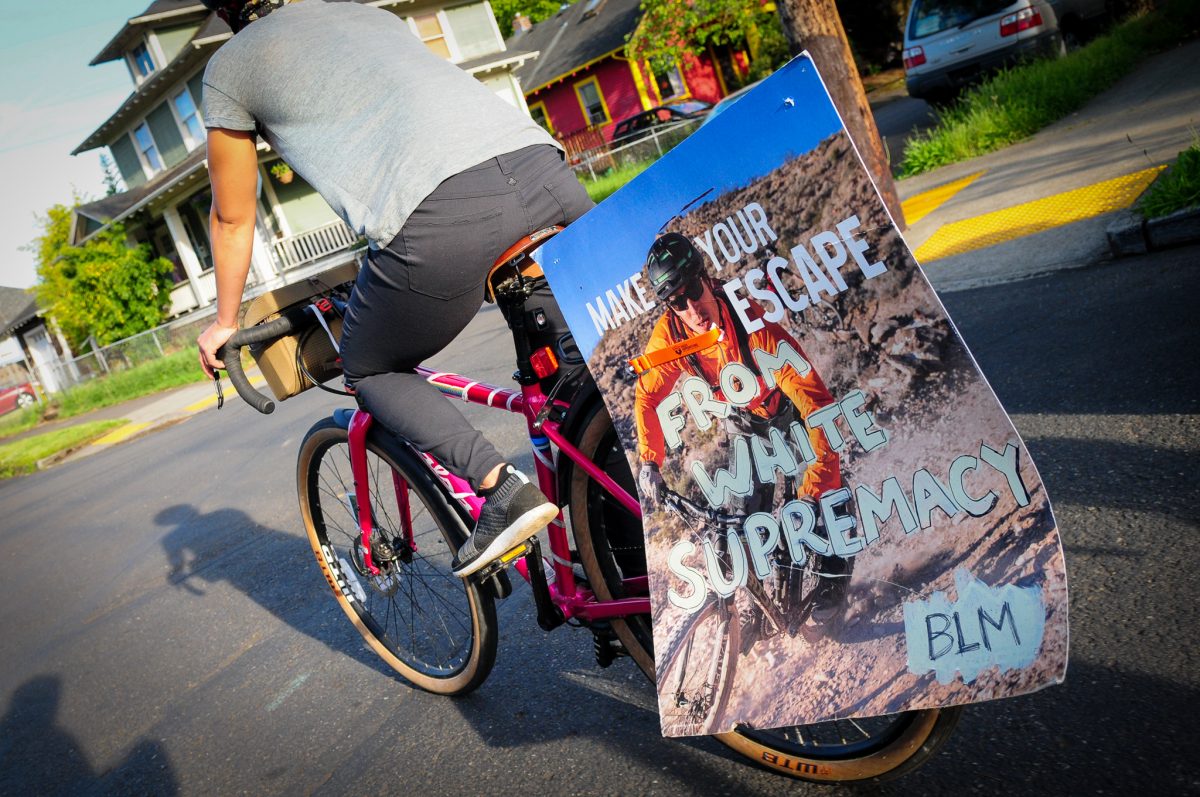
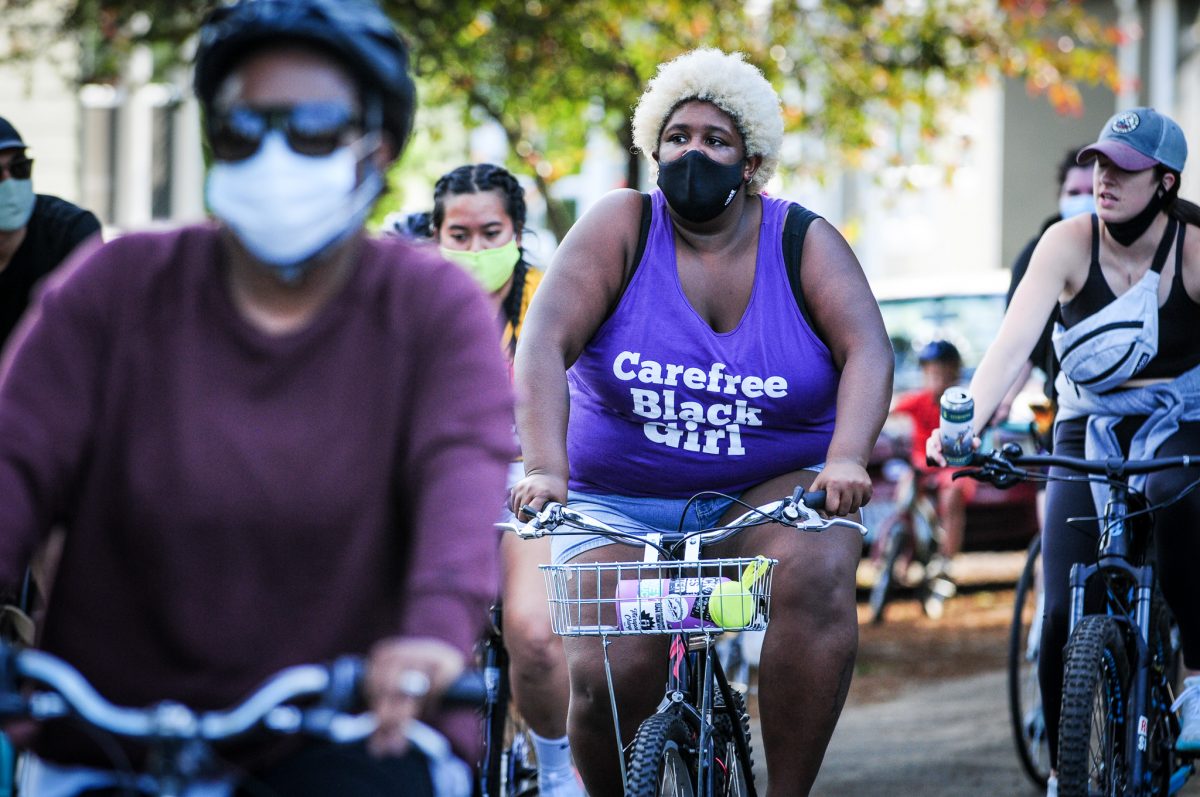
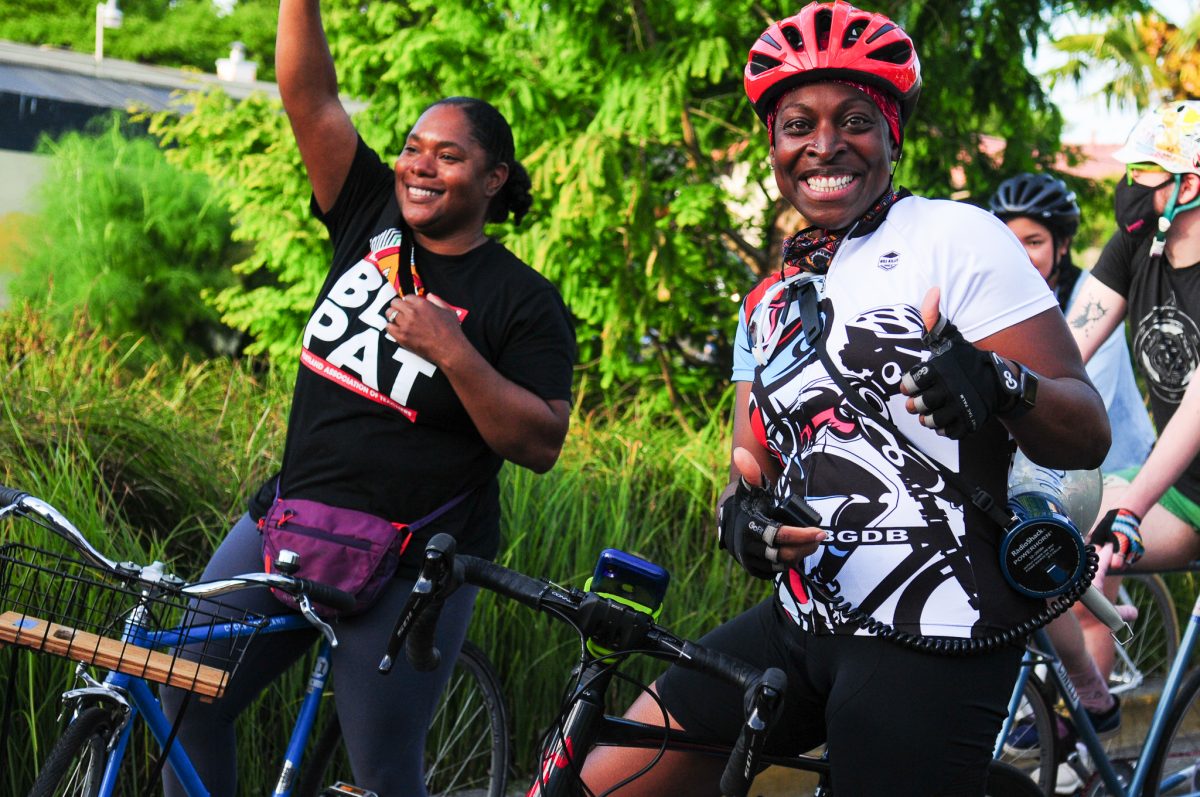
While fun was the priority, everyone’s thoughts were still clearly attached to the protests over the death of George Floyd and calls to end the police violence that caused it. While there were lots of smiles last night, I was reminded that the pain and scares of being Black in America are always just beneath the surface and cannot be erased by a bike ride.
Advertisement
Here’s what a few of the riders shared with me about why they showed up and what it’s like to be Black on a bike in this moment…
Valarie Pearce, children’s book author and high school teacher
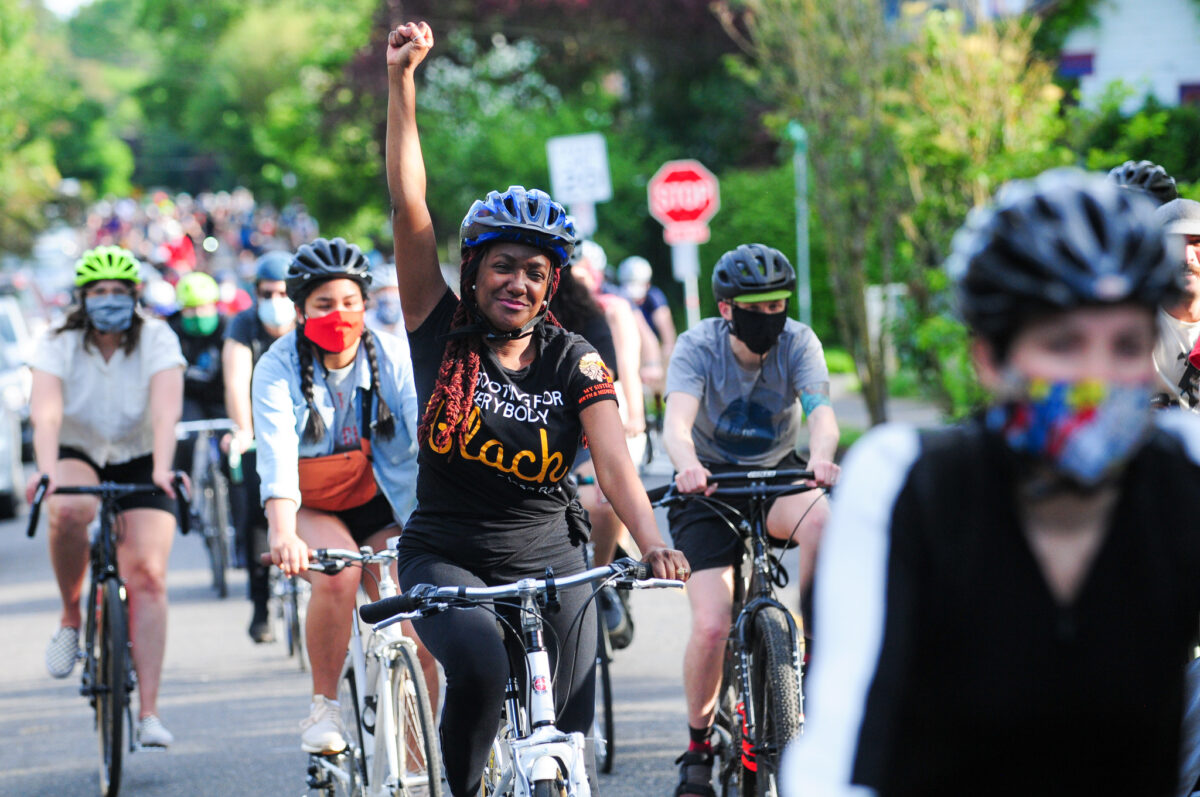
“I want to join with my community in saying we care about racial and social justice and this is beyond a moment, this is a movement that will keep on going and going, and this is just one of the beautiful ways that we’re out here doing it.
I started riding to get in shape after my daughters were born. This is my city. I went to Jefferson High. This is a part of what I do. A part of my community and my life. I love riding in the city. We have a beautiful city and l look to see the houses and the trees.
I think it’s important to know that black girls do bike. That we do enjoy it and that we come in all shapes and sizes. I think there’s this paradigm that you have to be super small and blonde to get on a bike and really go, but we do this and we love it.”
Elijah
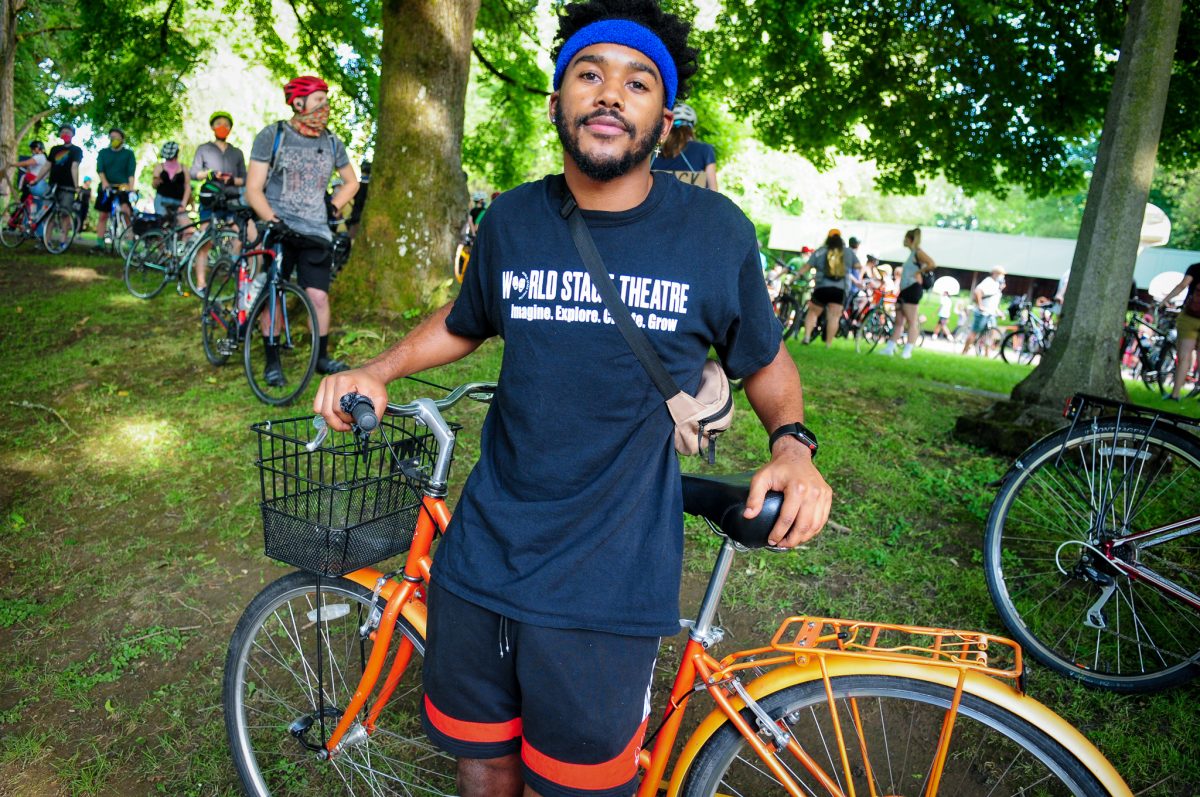
“The difference is that I live with [being Black] every day. Everybody is aware of it right now, but I was living the same way on May 25th [the day George Floyd was killed]. All those same fears existed for me. It’s now aware to you and other people who don’t look like me because of what happened to George Floyd, but before that that was already my life every day…
“My whole life I’ve grown up here and these same people that are here right now have treated me like I’m beneath them. So what makes me think that because they showed up at a park that I grew up in that all the sudden they’re here for me?!”
It’s never been like, ‘Oh I feel safe in Portland.’ That’s never happened. I’m a black man every day and I’ve been reminded of that throughout my childhood, through elementary school, through middle school — I was a 4.0 student and I still got treated like shit. That shouldn’t happen. And that was because I was black and I went to a majority white school.
So this bike ride is great and its nice to see people who look like me, but other than that this doesn’t change what’s going on. We’re not going to all come together after a bike ride. We’re not going to all come together after a couple protests. People’s hearts have to change. You’ve got to change your heart before you can just start doing all these laws and all this other shit. I need you to be for real.
Me getting on a bike don’t mean nothing. This is me coming together with my community to see people that look like me. Other than that, we still hurt. Nothing has changed for us. Until we get real change down the road then that’s when we’ll start feeling different. But right now, it’s all the same.
It’s cool to see other people here, but these same people don’t say ‘hi’ to me when they see me walking down the street. If I would have seen all these people walking down MLK two hours ago they would have looked the other way; but now we’re here at a bike ride all together and, ‘Ooh yeah I want change’ and all that — but where’s your heart at? If you’re not speaking from your heart and you’re not trying to make change and you’re not trying to listen. How do I trust that?
My whole life I’ve grown up here and these same people that are here right now have treated me like I’m beneath them. So what makes me think that because they showed up at a park that I grew up in that all the sudden they’re here for me?! Or are they here for me because they don’t want to be shamed into the guilt that they feel; they don’t want to be talked about and be on the wrong side of history; they don’t want to feel like, “Oh I’m siding with the oppressor.” It’s too late! You already made that choice. So it’s a bike ride. I feel great and I’m thankful for Nicole for putting this together. But it’s going to take more than a bike ride.”
Wayne
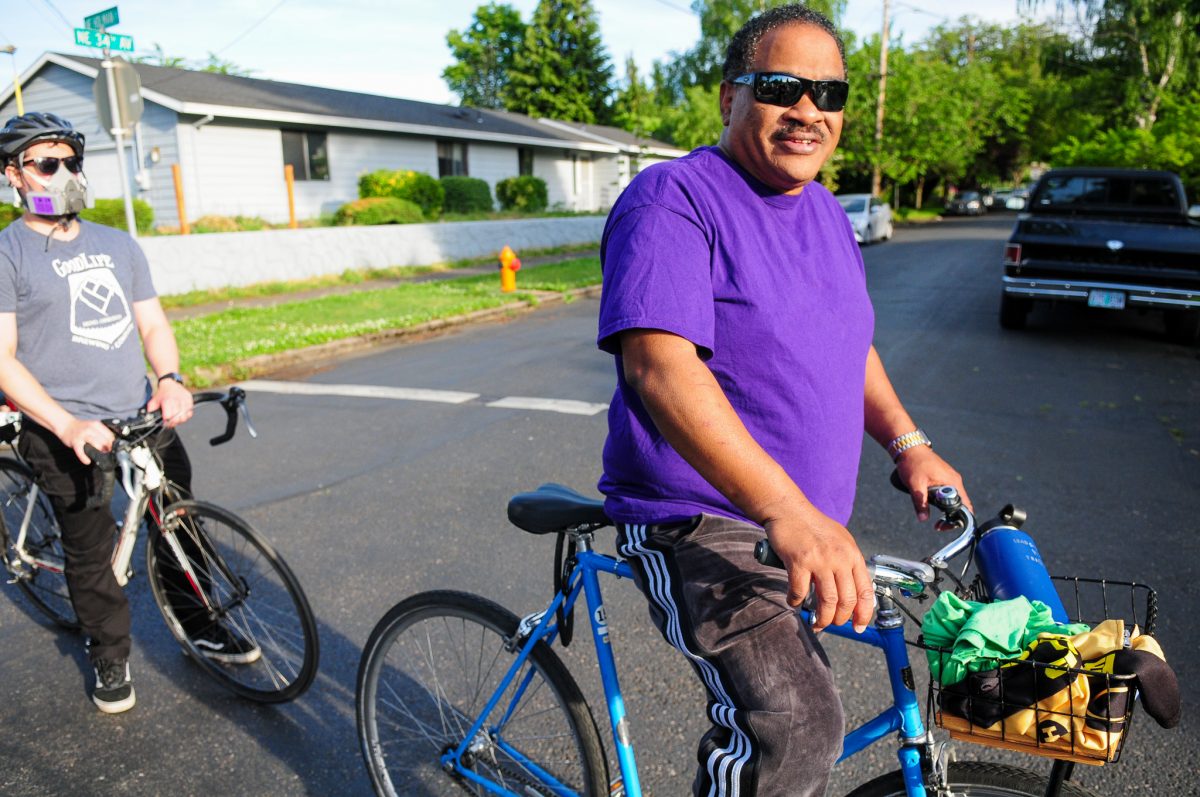
“It’s cool to be out here.”
Why?
“Because we weren’t coming out before. Before this, you and I wouldn’t be having this conversation; but we’re having one now. That’s why. I’m having conversations with people at the grocery store that would never talk to me before…
Being my age, I’ve seen a lot. So I hope this really means something at the end. We’ve had this all before. I lived through rioting in 1968 when Martin Luther King got killed we couldn’t stand outside on our own porch after 7:00 pm. Not a whole lot has changed. That was 1968. This is 2020. So if nothing changes now…”
What’s it like to be a Black man riding a bike in Portland?
“If I wasn’t in this group, I probably wouldn’t be biking. Because I don’t trust people in Portland. I don’t trust them. I sure as hell won’t ride on the streets. When you’re walking and somebody drives by and screams the “n” word at you, what do you think they going to do if you’re on a bike? If I’m on the sidewalk and they’re on the street, I’ve got options. If I’m on a bike on the street, do I got options? No. I’m vulnerable. So why would I put myself out there?”
Would you bike more if you didn’t have that fear?
“Yeah I would! I’d ride to work.”
Nichole Watson, ride co-organizer
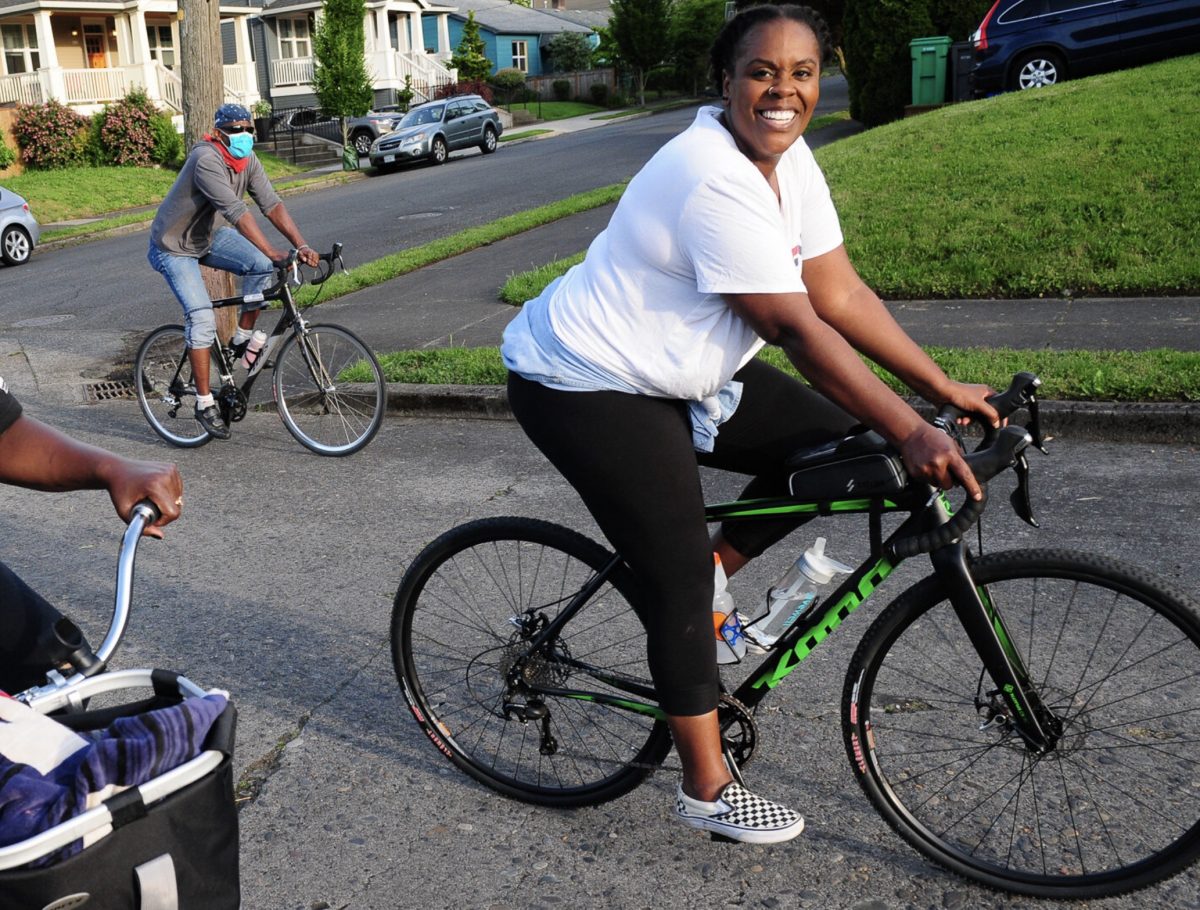
“I want people to know we all belong. I think sometimes, being in this body, you’re afraid to take up space. You’re afraid to be in the way. You’re afraid to demand people see you. And that’s what today was about. It was about visibility and we needed allies and advocates and activists to be out here with us so that we know the road belongs to us too…
I’m a thicker human being. I’m curvy. So being in the middle of the street, taking up lanes with this thick body and doing some of the things I do on my bike is evidence that this body is amazing and there’s so much it can do. The other part of it is also what it means to be in this Black body. And sometimes you need to take the lane and you need to demand that people see you and make space for you and that’s what today is about.”
What does it feel like to see all these people on your ride?
“It feels like beloved community. Like Dr. King said. Beloved community. And it just means we’re better together. And it just means that when we get off this track I want us to continue to make space for one another. Continue to take the lane and continue to make space so we all have room… or build a bigger road so we can all fit!
— Jonathan Maus: (503) 706-8804, @jonathan_maus on Twitter and jonathan@bikeportland.org
— Get our headlines delivered to your inbox.
— Support this independent community media outlet with a one-time contribution or monthly subscription.

